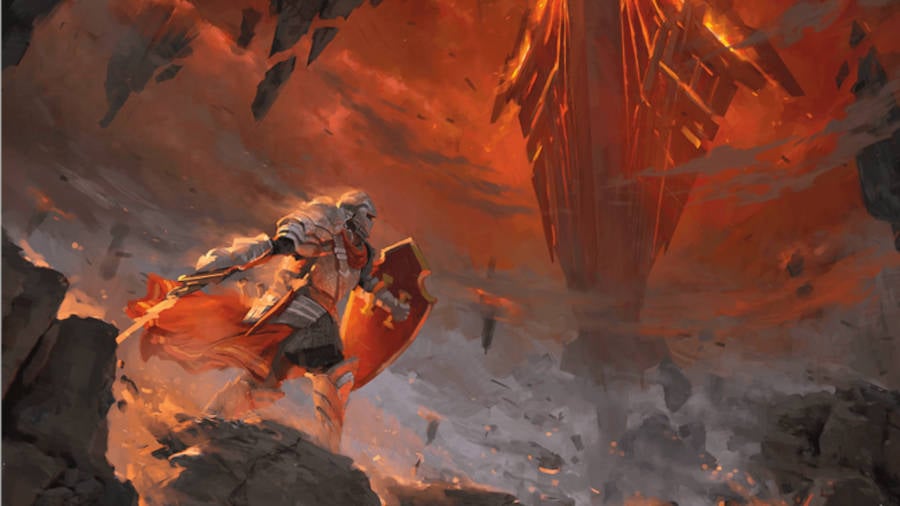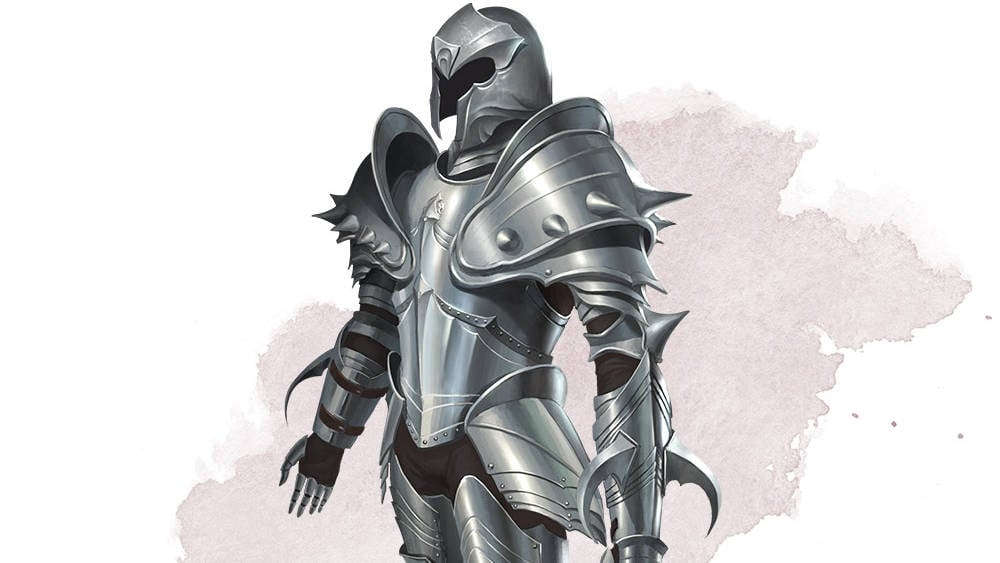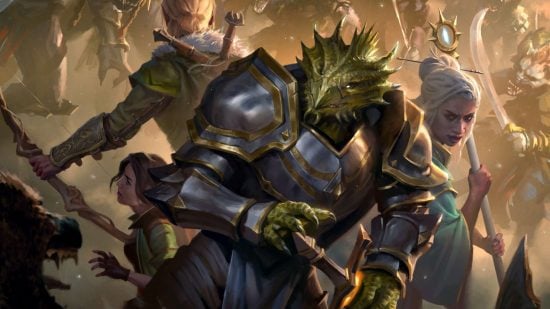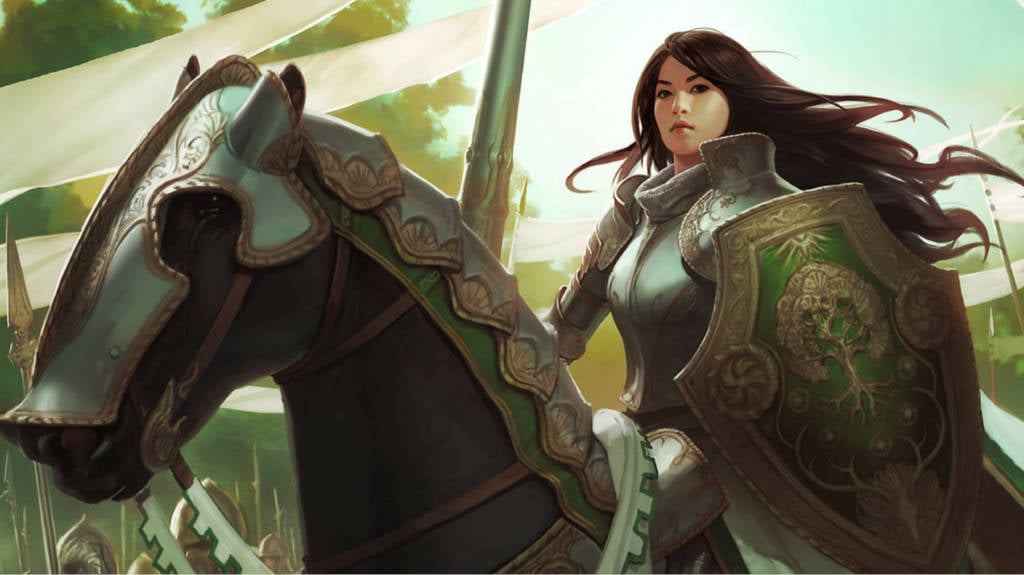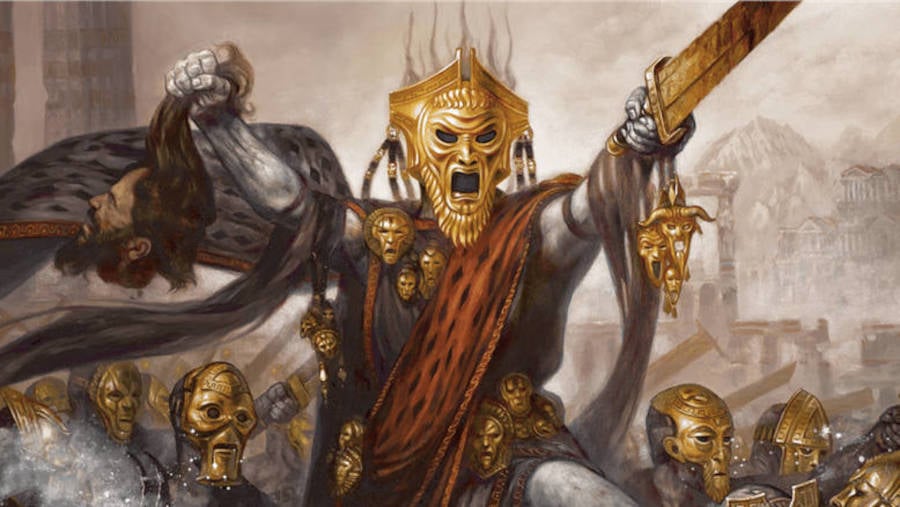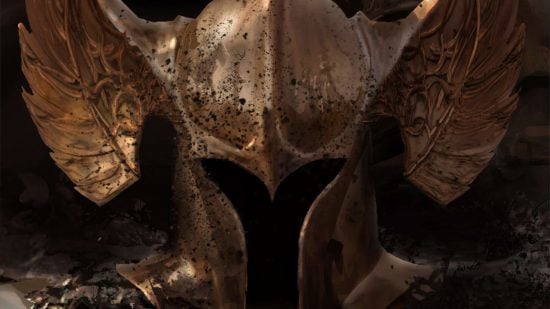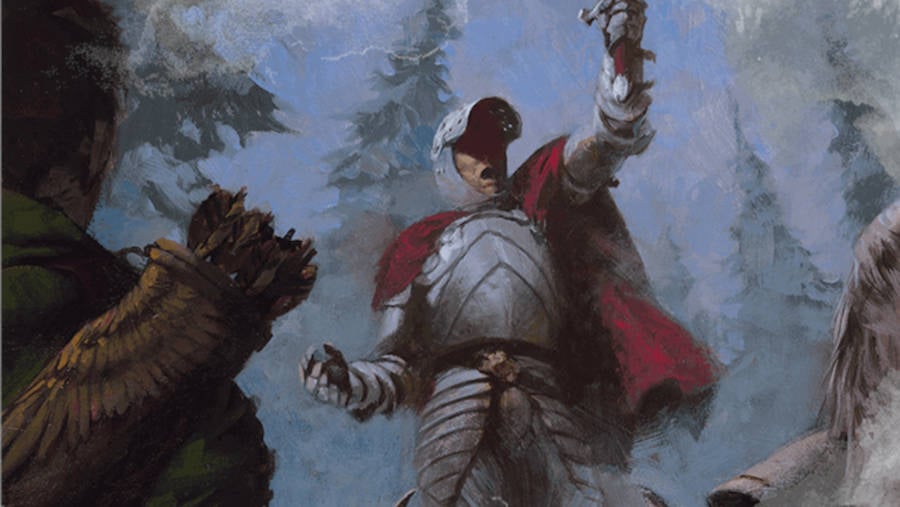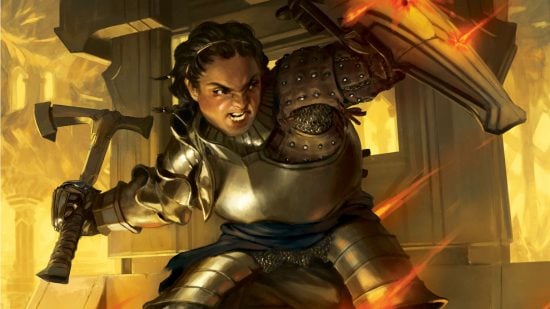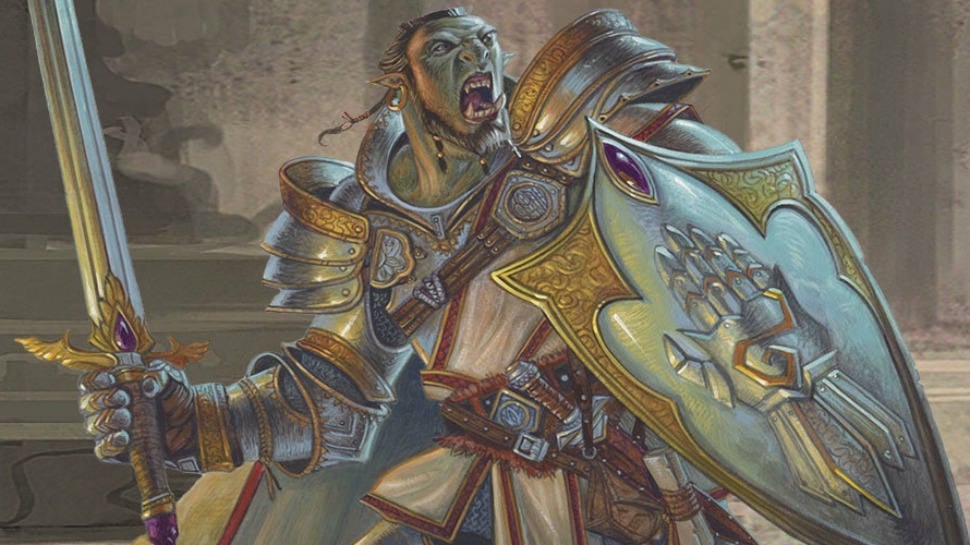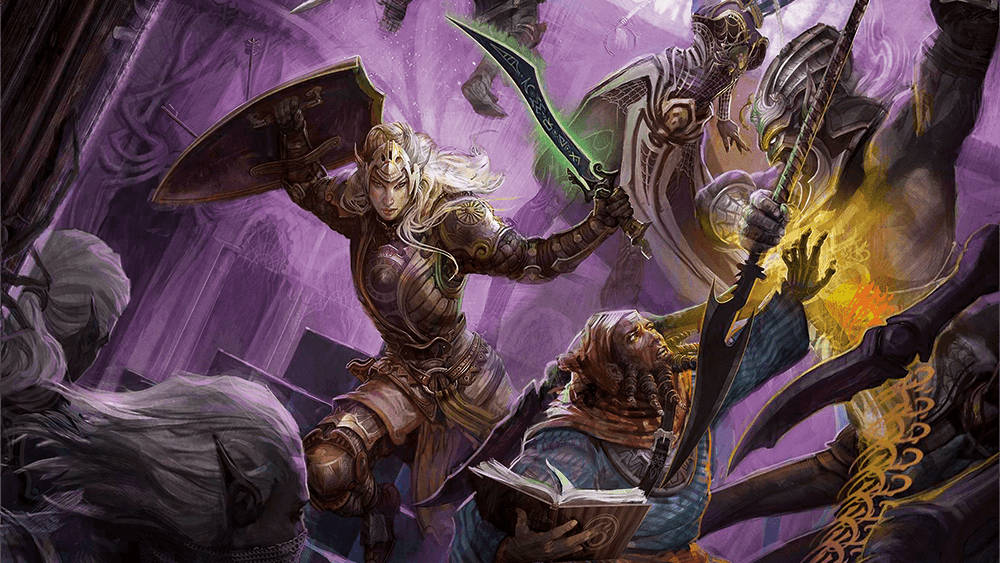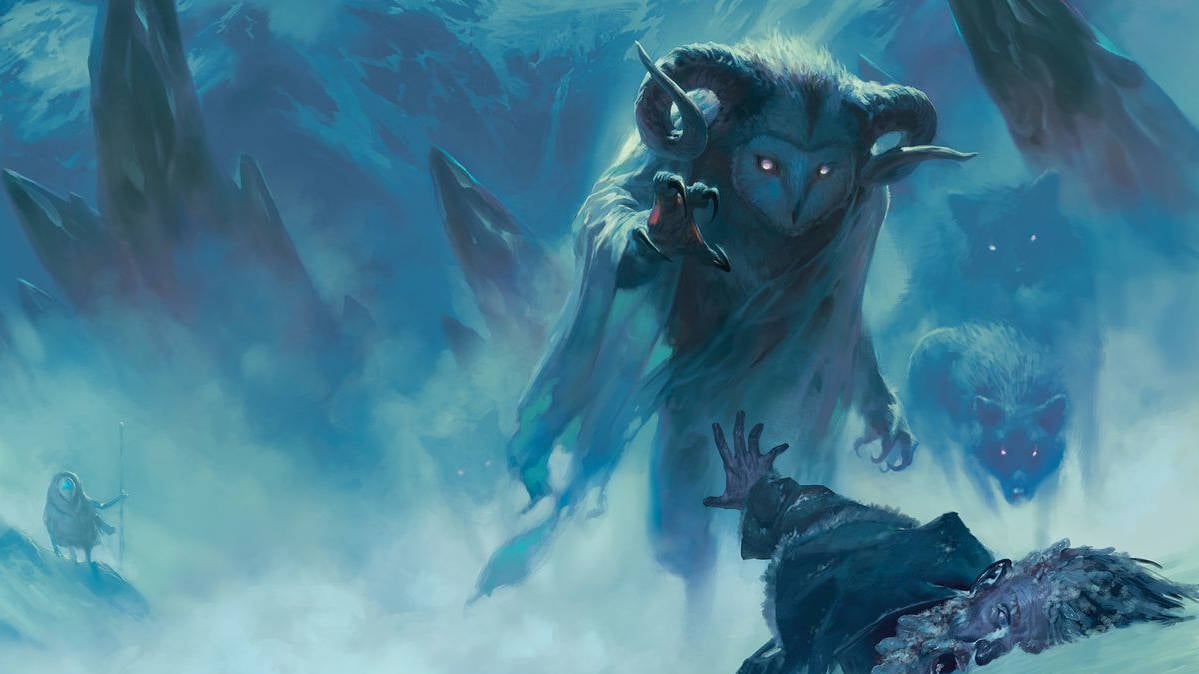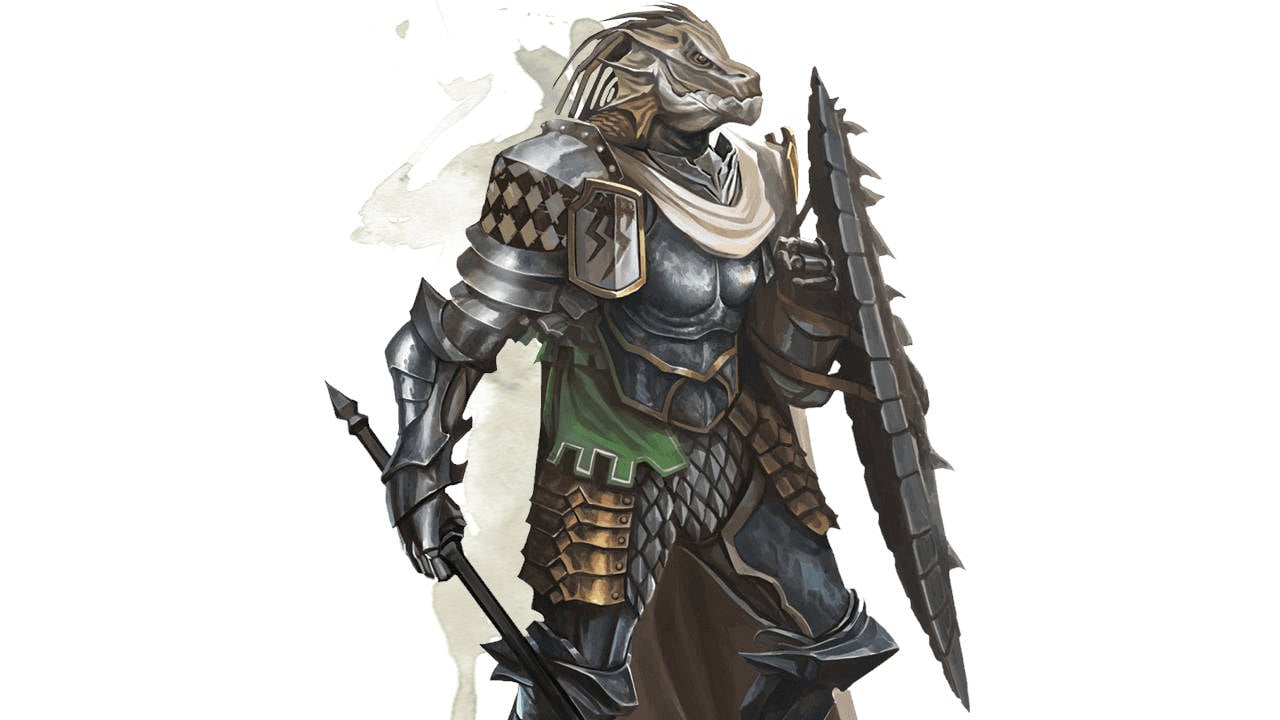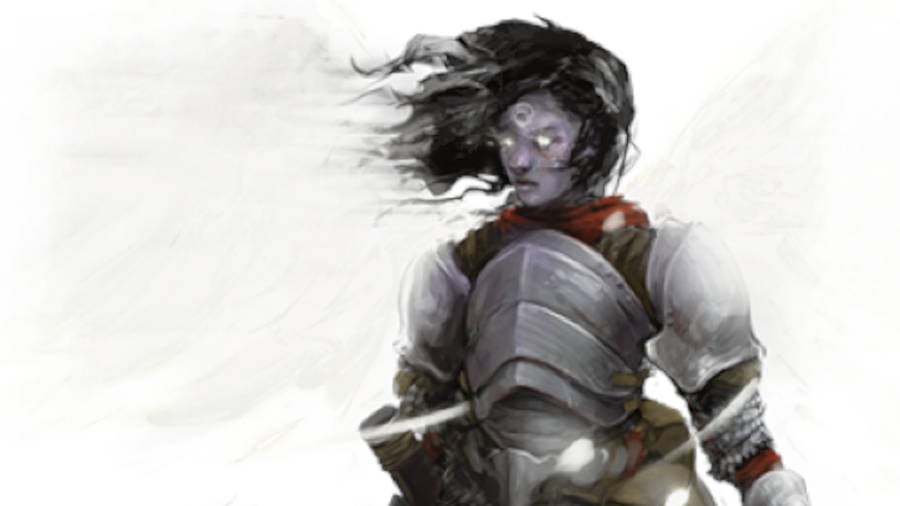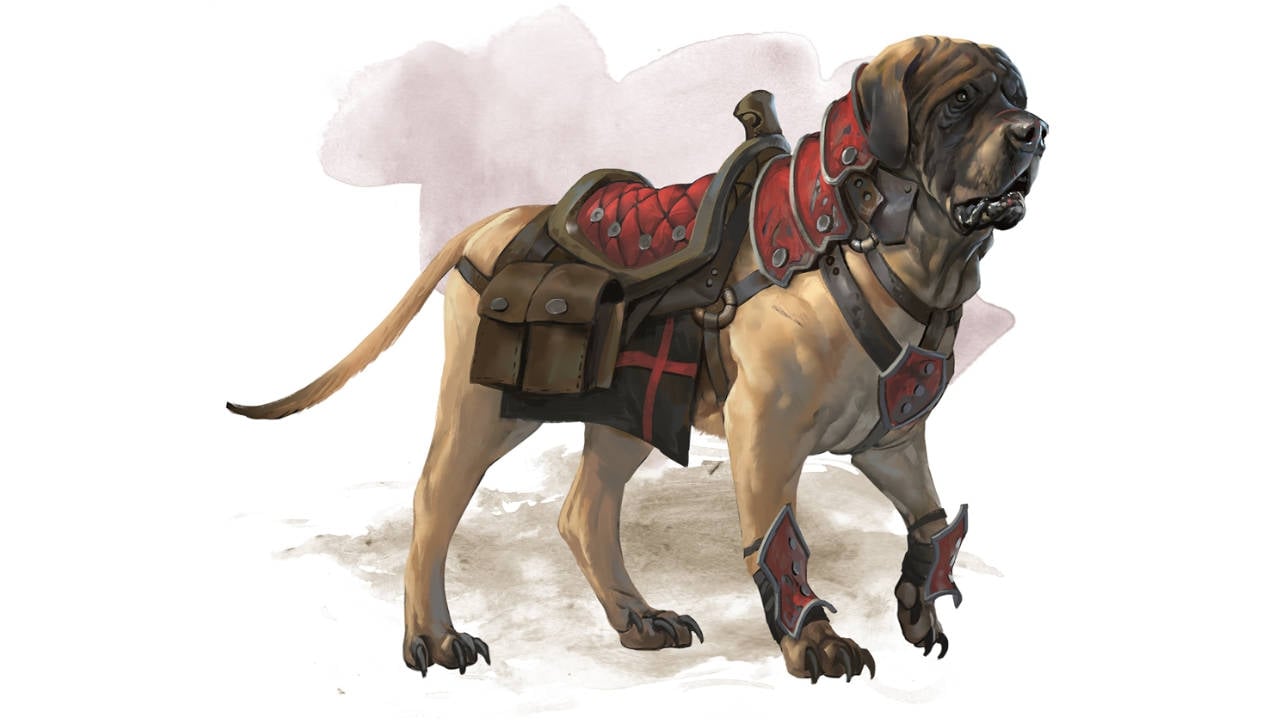Devout, durable, and dominating, the DnD Paladin 5e class is incredibly satisfying to play in fifth edition Dungeons and Dragons. As both support and striker, you’ll be called on to soak up hits and dish out bursts of damage. Meanwhile, a divine connection to your patron deity imbues you with unmatched potential to buff and debuff the combatants around you. If the D&D 5e Paladin appeals more than other DnD classes, you’ll find all you need to know to play one right here.
We’ll offer an insight into DnD character creation, survey the various Paladin subclasses 5e, and highlight the best and worst Paladin 5e spells. We’ll even outline a few ready-made DnD character builds, complete with suggested DnD races and 5e feats to bulk out your DnD character sheet.
Here’s the DnD Paladin 5e class guide:
- Paladin 5e stats
- Paladin 5e fighting styles
- Best race for Paladin 5e
- Paladin 5e oaths: subclasses
- Paladin 5e spells
- Paladin 5e builds
Paladin 5e stats
With recognizable roleplaying touchstones and enviable combat prowess, the Paladin 5e class is a favorite of D&D veterans and newcomers alike. You could play several Paladins back-to-back, and emerge with a startlingly different character each time. Even so, you need to consider some core Paladin 5e stats for your character:
| Hit dice | 1d10 per level |
| HP at lvl up | 1d10 (or 6) + Constitution modifier |
| Primary ability scores | Dexterity or Strength and Constitution |
| Armor proficiency | All DnD armor, DnD shields |
| Weapon proficiency | Simple weapons, martial DnD weapons |
| Tool proficiency | None |
| Saving throws | Wisdom, Charisma |
While Paladins are useful spellcasters, their key aptitude lies in muscular might. Prioritize Strength (Str) so you can come out swinging your best in any fight, and continue to pile into the DnD stat when you get the chance.
Charisma (Cha) is the go-to second favorite, but if you only want to tank and don’t mind letting your magical duties fall to the Cleric 5e or Wizard 5e of your party, consider bolstering Constitution (Con) instead.
Bear in mind that you don’t need Charisma to use your Lay on Hands healing ability, or your unholy-monster-detecting Divine Sense. These class features will see you through the first few levels. Charisma will affect the more potent Paladin oath spells you unlock at higher levels.
In either case, it’s best not to totally ignore Charisma, but you can get away with leveling it alongside Constitution, if your adventure calls for hard-nosed brutality over creative spellcasting.
Intelligence and Wisdom can be forgotten as dump stats, while Dexterity is unlikely to ever be of use, given the heavy armor you’ll be wearing.
Paladin 5e fighting styles
Right from the get-go, Paladins get access to some envious class features. Divine Sense prevents any undead, fiendish, or celestial troublemaker sneaking up on you within a 60-foot radius, and Lay on Hands provides a pool of HP that you may draw from to cure the wounds of party members.
But early customization comes in the form of your Paladin 5e fighting style. Chosen at level two, this option significantly impacts your combat capabilities and your role within the party. Choose carefully, and preferably have a class build in mind when making your pick.
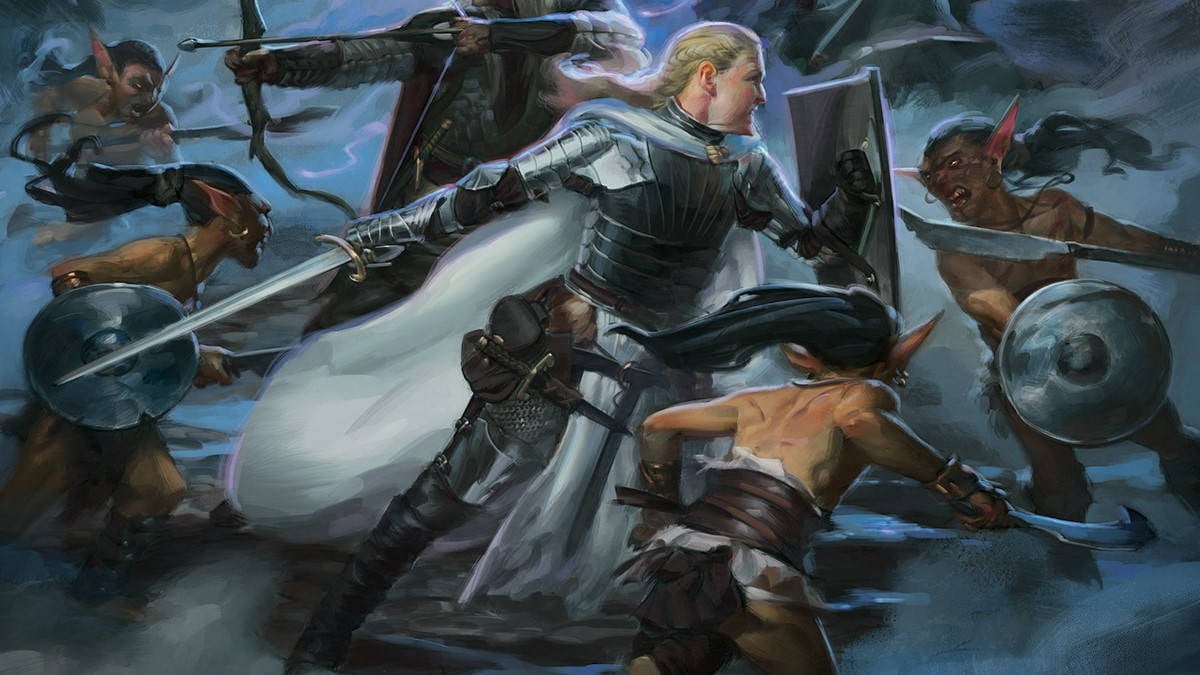
Defense
The turtliest of all fighting styles, Defense grants +1 AC bonus when you’re wearing armor. Permanently applicable, as you’re likely to have some plate armor or chain mail on at all times, it’s a little redundant for a class that can buff its tanking abilities more effectively through other means, particularly as 5e monsters tend to be slightly underpowered.
Dueling
If you imagine your Paladin will be grasping a sword in one hand and shield in the other, pick this style. When wielding a single melee weapon in one hand, you gain +2 to that weapon’s damage rolls, making for some hefty meat cleaving.
Great Weapon Fighting
If swinging two-meter-long greatswords in lumbering attacks is more your thing, go for this Style. It lets you reroll all results of one or two on your damage dice with two-handed and versatile weapons, ensuring you’ll consistently dish out pernicious blows. This is particularly effective with the greatsword, which rolls two dice for damage.
Protection
For supportive builds, this style lets you use your reaction to impose disadvantage on any enemy attack made within a five-foot radius. Particularly useful in a melee-heavy party that will cluster together during fights – although you’ll have to be wielding a shield to leverage its effect.
(The following fighting styles are the most recent additions from Tasha’s Cauldron of Everything.)
Blind Fighting
Granting blindsight, this style lets your character perceive everything around them, regardless of darkness, invisible enemies, fog, or anything else that might block their vision. Very situational; when it’s employed, it works wonderfully, but will sit idly by the rest of the time. Consider whether your DM is likely to throw lots of vision-impairing situations your way, or if your party has the tools to create its own blackouts – certain Rogue 5e and Warlock 5e builds are great at this.
Blessed Warrior
Merging class lines, Paladins following this Style take two DnD cantrips from the DnD Cleric spells list. The lack of melee cantrips on offer doesn’t sit well with the Paladin’s Divine Smite class feature, but the evocation spells and offensive cantrips will serve you well if you’re leaning into spellcasting.
Interception
Functionally similar to Protection, you can use your reaction to reduce the damage dealt to a targeted creature within five feet of you by 1d10 plus your proficiency bonus. You’ll have to be wielding a simple or martial weapon, or a shield, to apply this style’s effect.
Best race for Paladin 5e
Playing a Paladin means being devout and uncompromising, so the best race for Paladin 5e characters is a strong and charismatic one. High Strength will enhance your melee capabilities, while a Charisma boost will improve your spellcasting, increasing the power of your magic as you better channel the divine inspiration of your chosen deity – as well as assisting you in being the ‘face’ of the party, if you so choose.
Dragonborn
Prime Paladin material. The DnD Dragonborn race’s natural +2 Strength and +1 Charisma, alongside the innate damage resistance of their Draconic Ancestry, makes for a fantastic baseline. Your Constitution will also enhance the effectiveness of your Breath Weapon, increasing the saving throw that any creatures in the vicinity must make to escape your destructive exhalation.
Triton
+1 Strength, +1 Constitution, and +1 Charisma suit Tritons (as found in Volo’s Guide to Everything – you can also choose where you put your skill points in the Monsters of the Multiverse version of Triton) to slightly tankier builds, without sacrificing spellcasting.
Their innate Charisma-driven magical abilities pair nicely with Paladins’ divine spellcasting, and lead onto some useful, albeit not supremely impressive, combat-manipulation spells. Their tendency towards lawful-good DnD alignments is perfect for roleplaying an ardent, religious zealot, and amphibious abilities, like breathing underwater, aren’t too bad, either.
Half-Elf
A versatile choice, their +2 Charisma makes for fantastic spellcasting potential, while +1 in two ability scores of your choice provides scope for weird and wonderful creations. DnD multiclassing and strange but creatively rewarding builds are perfect for the DnD Half-Elf. Proficiency in two DnD skills of your choice also grants a level of customizability not seen in other races.
Aasimar
A +2 Charisma buff (though again, you can choose where to place stats in Monsters of the Multiverse) and Celestial Resistance make Aasimar a fine fit for support and restorative roles, alongside their Healing Hands ability, which lets you restore party members’ HP. If you want to fully lean into the magical capabilities of a Paladin, choose a Scourge Aasimar for an extra +1 Con and an offensive radiant spell, or a Fallen Aasimar, for a Str boon. Plus, being divine beings, Aasimar’s align narratively with Paladins’ noble ideals, so creating a backstory is easy.
Paladin 5e oaths: subclasses
You’ll swear a sacred Paladin 5e oath upon reaching level three, committing yourself to a righteous path that grants specific features and a bespoke spell list. Each subclass immediately grants two Channel Divinity options (divine spells that act as the staple abilities of each oath), alongside more subclass features at higher levels, and broader specialties that are pivotal in the role and progression of your Paladin.
Because your character has to take a literal oath to become a Paladin, you’re expected to follow it throughout your campaign. This means, as well as unique mechanics, each different Paladin comes with a recommended list of tenets they should live by.
You can use these to roleplay and better define your character. And if you choose to break them, there might be consequences. Perhaps your chosen god will intervene, or your DM will suggest switching your sublcass to the optional and infamous Oathbreaker.
Whatever kind of Paladin you want to be, choose wisely (or use our Paladin subclasses 5e guide to do the hard work for you).
Oath of Devotion 5e
Found in: Player’s Handbook
| Level | Subclass abilities |
| 3 | Sacred Weapon, Turn the Unholy |
| 7 | Aura of Devotion |
| 15 | Purity of Spirit |
| 20 | Holy Nimbus |
Suggested tenets:
- Honesty
- Courage
- Compassion
- Honor
- Duty
The standard Paladin incarnation, the Oath of Devotion 5e subclass is the closest to a knight in shining armor that you’re likely to get within D&D; all gracious chivalry, angelic righteousness, and honorable justice in service of the DnD gods. Alongside that comes a distinct lack of specialty, and a mixed bag of abilities.
The Oath of Devotion spell list is an assortment of powerful, but situational offerings, and a couple of restorative spells, which prove a little redundant next to Paladins’ Lay on Hands ability.
If you are one of the few to progress your Paladin to level 19, Commune, which allows you to contact your deity and ask up to three yes-or-no questions, is an extraordinarily powerful roleplaying and trap-navigating tool. But you’ll need the wherewithal to ask the right questions.
The level three Sacred Weapon Channel Divinity option solidly buffs your attacks, adding your Charisma modifier to attack rolls for one minute, and makes for a nicely scalable boon. This is the subclass to pick if you’re after a ‘typical’ Paladin experience, or new to D&D and chasing a rewarding, but straightforward role.
Oath of Ancients 5e
Found in: Player’s Handbook
| Level | Subclass abilities |
| 3 | Nature’s Wrath, Turn the Faithless |
| 7 | Aura of Warding |
| 15 | Undying Sentinel |
| 20 | Elder Champion |
Suggested tenets:
- Mercy
- Kindness
- Defending against evil
- Beauty
- Joy
- Courage
Ambitious and portentous, Paladins of the Oath of Ancients 5e subclass throw themselves into the cosmic struggle of light versus dark, receiving some splendid Druid 5e-like powers to show for it.
Much of their spell list focuses on restraining enemies, immobilizing them to cut down in your next attack. At level three, Ensnaring Strike lets you trap any struck creatures in a thorny cage, and deals a tasty 1d6 piercing damage, which scales up with higher-level spell slots.
At level 13, you gain the brilliant area-of-effect spell Ice Storm, to wail pounds of frozen water in a 20-foot radius.
Some highly situational abilities aside, this subclass lets you embrace creativity within your damage dealing, lining up a chain of boons and debuffs to decimate enemy creatures under a single blow. With some magical resistance, too, it makes for a forgiving, and rewarding subclass.
Oath of Vengeance 5e
Found in: Player’s Handbook
| Level | Subclass abilities |
| 3 | Abjure Enemy, Vow of Enmity |
| 7 | Relentless Avenger |
| 15 | Soul of Vengeance |
| 20 | Avenging Angel |
Suggested tenets:
- Fight the greater evil
- No mercy for the wicket
- Succeed by any means necessary
- Help those hurt by evil
When violent retribution is the order of the day, the Oath of Vengeance 5e subclass stands tall above the rest. Headstrong, and worryingly keen to hand out justice in the form of vicious attacks, it suits simple offensive builds that forgo protective tactics in favor of quick melee kills.
Its class features and spell list focus primarily on persistent damage dealing. Third level Abjure Enemy imposes disadvantage on enemies, and Vow of Enmity provides advantage to your own attack rolls for a full minute, letting you slice and dice through creatures with ease.
At level five, Misty Step is a neat way to teleport around the battlefield and coordinate group attacks, while at ninth-level the spells Haste 5e and Protection from Enemy are a potent pair of supportive buffs.
Straightforward and effective, this subclass is best played with speed and aggression. Rush into the fray of combat, whack on some buffs, and get bludgeoning.
You can learn more in our full DnD Oath of Vengeance guide.
Oath of Conquest 5e
Found in: Xanathar’s Guide to Everything
| Level | Subclass abilities |
| 3 | Conquering Presence, Guided Strike |
| 7 | Aura of Conquest |
| 15 | Scornful Rebuke |
| 20 | Invincible Conqueror |
Suggested tenets:
- Destroy the hope of your enemies
- Rule with an iron fist
- Strength above all
Glory in battle and total domination of the enemy are the hallmarks of the Oath of Conquest 5e subclass, and its array of crowd control abilities lend it nicely to large encounters. Wade boldly through multiple foes, and strike down swarms of smaller enemies as you go.
This oath really shines through its features. Although both its Channel Divinity options are formidable, try combining Conquering Presence, which frightens a creature for one minute, with seventh-level Aura of Conquest, which incapacitates and damages all frightened enemies within a 10-foot radius, for easy kills.
Mix in the Fear spell at ninth-level, letting you frighten every creature in a 30-foot radius on a failed Wisdom saving throw, and you’ve got a powerhouse of attrition.
Leveraging collective fear in your enemies is very much the focus of this subclass, but even the Armour of Agathys spell you get at third level, which grants five additional HP, and Spiritual Weapon – which at fifth level creates a floating weapon to freely move and attack enemies – will make you useful outside of swarm encounters.
Oath of Glory 5e
Found in: Mythic Odysseys of Theros / Tasha’s Cauldron of Everything
| Level | Subclass abilities |
| 3 | Peerless Athlete, Inspiring Smite |
| 7 | Aura of Alacrity |
| 15 | Glorious Defense |
| 20 | Living Legend |
Suggested tenets:
- Actions over words
- Face challenges with courage
- Hone the body
- Discipline the soul
Heroism and bravery, mixed with a sense of camaraderie and passion for bodybuilding, the Oath of Glory 5e subclass is about buffing the physical abilities of you and your party, both offensively and defensively.
Its Channel Divinity options are undoubtedly the standout qualities of this class. Peerless Athlete grants advantage on Athletics and Acrobatics checks for 10 minutes, while Inspiring Smite lets you distribute temporary hit points to your party after a successful hit. And both can be used as Bonus Actions.
But the subclass falters in its spell list. With most of its worthwhile spells requiring Concentration, you’ll be severely limited in how often you can successfully leverage your otherwise powerful collection. It’s particularly irritating for a subclass that doesn’t boast a notably high Con score, so can’t bank on succeeding Concentration saving throws, letting their spellcasting go to waste.
Oath of Redemption 5e
Found in: Xanathar’s Guide to Everything
| Level | Subclass abilities |
| 3 | Emissary of Peace, Rebuke the Violent |
| 7 | Aura of the Guardian |
| 15 | Protective Spirit |
| 20 | Emissary of Redemption |
Suggested tenets:
- Peace
- Innocence
- Patience
- Wisdom
Probably the most unusual of all the Paladin subclasses, those who take the Oath of Redemption 5e are pacifists at heart, begrudgingly pursuing conflict only when all non-violent options have been exhausted. It makes for a fantastic, spell-focused support character, better suited to helping others and dissuading enemies from attacking, than to bonking things on the head.
Its third-level Emissary of Peace Channel Divinity option lets you effectively discourage violence, granting yourself a +5 Persuasion bonus. But even when the fists inevitably come out, you won’t be left on the sidelines. Seventh-level Aura of the Guardian lets you take damage instead of any creature within 10 feet, and can be combined with Protective Spirit at level 15 to heal 1d6 + half your Paladin level mid-combat.
Throw in the standout spell Sleep at third level, and you’ve got yet another way to avoid getting into fights. At ninth level, Counterspell 5e can block incoming magic targeting you or your party. The Oath of Redemption subclass is not only a thematically fun choice, but one of persistent utility.
Oath of the Crown 5e
Found in: Sword Coast Adventurer’s Guide
| Level | Subclass abilities |
| 3 | Champion Challenge, Turn the Tide |
| 7 | Divine Allegiance |
| 15 | Unyielding Spirit |
| 20 | Exalted Champion |
Suggested tenets:
- Law
- Loyalty
- Courage
- Responsibility
Exemplary lawful warriors who fight for the preservation of natural, divine order, those who take the Oath of the Crown 5e excel as party defenders and tanks. Soak up enemy attacks directed towards your compatriots for the sake of your less-armored allies.
At level three, Champion Challenge lets Paladins prevent all creatures within a 30-foot radius from moving away from them – particularly useful to keep enemies where you want them, in open areas, as well as preventing them dashing towards your squishier party members. On reaching level seven, Divine Allegiance lets you use your reaction to substitute your own HP for that of any ally within a five foot radius.
And this oath’s spell list is a trove of treasures. Aura of Vitality will have you healing individual party members for 2d6 HP, including yourself. Act as a meat shield in combat, and revitalize yourself after the blows have stopped. Oath of the Crown is a subclass that can easily act as the linchpin of an entire front line.
Oath of the Watchers 5e
Found in: Tasha’s Cauldron of Everything
| Level | Subclass abilities |
| 3 | Watcher’s Will, Abjure the Extraplanar |
| 7 | Aura of the Sentinel |
| 15 | Vigilant Rebuke |
| 20 | Mortal Bulwark |
Suggested tenets:
- Vigilance
- Loyalty
- Discipline
Another strongly thematic, but very narrow subclass, those who take the Oath of the Watchers 5e dedicate themselves to warding off extraplanar threats. If the campaign you’re playing is likely to sweep you across the DnD planes, or bring you face-to-face with otherworldly DnD monsters, then this subclass will be of great use. Otherwise, much of its glorious potential will be wasted.
Their third-level Watcher’s Will feature grants advantage on Int, Wis, and Cha saving throws for a number of creatures equal to your Charisma modifier. It’s nicely scalable, and a particularly useful defense against the mind-bending effects of outerplanar creatures. At level seven, Aura of the Sentinel boosts the initiative of all party members within a ten-foot radius, which comes in particularly handy when you want to run down an enemy’s HP at lightning speed.
Early-level spells, including Detect Magic and Alarm, are solid, if unremarkable, but higher-level abilities give fantastic magic resistance and debuffs. Make sure to invest heavily in Cha to get the most out of this magic-oriented subclass.
Oathbreaker 5e
Found in: Dungeon Master’s Guide
| Level | Subclass abilities |
| 3 | Control Undead, Dreadful Aspect |
| 7 | Aura of Hate |
| 15 | Supernatural Resistance |
| 20 | Dread Lord |
A fallen Paladin who has broken their code, they question their beliefs – but retain a strength of conviction. Darkness has crept into their mind, contorting their faith and estranging them from the divinity they once espoused. This twist on the classic Paladin formula translates into a suite of aberrant abilities that center on high damage, and the undead.
The best Channel Divinity option is Dreadful Aspect, frightening all creatures within a 30-foot radius. The alternative, Control Undead, lets you bring any undead creature under your mental control.
But if you’ll be playing your Paladin for a while, it’s made a little redundant by the spell Animate Dead at ninth level, letting you summon an undead servant. If nothing else, these starter-necromancy spells are fun to play around with.
At level 15, Supernatural Resistance grants permanent protection from bludgeoning, piercing, and slashing damage dealt by non-magical weapons, seriously boosting your defenses. Later on, higher-level spells like Blight and Contagion can really help you pile on damage. If you’re looking for a melee-focused, damage-competent subclass that fits with darker Paladin roleplay, Oathbreaker 5e is the clear choice.
Oath of the Open Sea 5e
Found in: Critical Role content
| Level | Subclass abilities |
| 3 | Marine Layer, Fury of the Tides |
| 7 | Aura of Liberation |
| 15 | Stormy Waters |
| 20 | Mythic Swashbuckler |
Suggested tenets:
- Oppose oppression
- Trust the skies
- Adaptability
- Exploration
Clerics sworn to the Oath of the Open Sea 5e are free spirited adventurers, and monster hunters who fight back against the dread beasts that stalk the deep. Their spell list is attuned to wind, water, and freedom of movement, and they’re capable of controlling the flow of battle like the gods of the ocean controlling the waves
The two channel divinity options have potent combat control effects. Marine Layer generates a dense fog that you (and creatures within five feet) are able to see through, but which obscures your opponents’ vision. Fury of the Tides allows you to throw back any enemy you strike by 10′, enough to push them off the side of a boat (or a cliff!)
At seventh level, Aura of Liberation makes you and nearby allies immune to being grappled and restrained, as well as freeing you up to move without penalty underwater. The 15th level Stormy Waters is a useful reaction ability that allows you to inflict damage on enemies that enter your reach, and potentially knock them prone – this and Marine Layer are good excuses to fight with a Reach weapon
Paladin 5e spells
Although most at home in the thick of battle, swinging a greatsword and relying on thick plate armor to glance incoming blows, Paladins have a powerful spell list open to them. At second level, you’ll gain two spell slots, and a plenty of support, buffs, and restorative options to fill them. The rapid growth of spell slots that Paladins gain as they level makes them formidable defensive spellcasters, who can challenge the utility of any half-baked Cleric.
When picking Paladin 5e spells, bear two things in mind: Concentration and Charisma. Many of your spells will require Concentration, and therefore be of little use if you’re charging to the frontline of a fray to soak up enemy hits unless you have a high constitution score. You can also only maintain one concentration spell at a time.
Similarly, the higher your Charisma modifier, the more juice you’ll get from your spellcasting abilities. Your Cha modifier dictates how many spells you may prepare after each long rest and, in several cases, their effectiveness.
As for picking spells, Paladins have it easy. Every option listed in their spell list is available for preparation (so there’s no need to spend ages choosing which spells to learn each time you level up, like a Wizard).
When Paladins gain access to an oath spell, they always have it prepared (and oath spells don’t count against the number of spells preparable each day). Use this freedom to experiment with the many options available, and test out creative combinations. You’ll soon find particular spells trump the benefits of others, or are incompatible with one another.
Here are some of the best Paladin spells to sniff out:

Shield of Faith
Level: One
As a bonus action, cast a shield granting +2 AC to any creature within 60 feet. Combined with heavy armor and a hand shield, low-level attackers won’t be able to touch you – and it can save a fellow party member when they’re in a tough spot.
Find Steed
Level: Two
Summon a loyal animal to fight by your side, whether a horse, mastiff, camel, or anything else you can wrangle out of your DM. Even if not used as a mount, it’s invaluable for storing equipment, or sending into battle. Anything you summon will stick around until it drops to zero HP.
Revivify
Level: Three
A classic. Revive any creature that’s died in the last minute to 1 HP. You can never have too many spellcasters ready to use it, and it’s essential if nobody else has learned resurrection spells.
Death Ward
Level: Four
If a target creature would die, they’re spared from death, and instead fall to one HP. Outrageously useful, its eight-hour duration means you don’t even need to carefully plan for its use. Cast it at the beginning of your session if you think you’re likely to meet any insta-killers.
Destructive Wave
Level: Five
Create a burst of divine energy that deals 5d6 damage, plus 5d6 radiant or necrotic damage, to every creature 30 feet in front of you that fails on a Con saving throw. Its potential to impair whole swathes of enemies is remarkable in itself, but particularly useful for Paladins that struggle with area-of-effect attacks.
These are the worst Paladin spells, which are best avoided:
Purify Food and Drink
Level: One
Remove poison and disease from any non-magical drink or foodstuff. This would be a remarkably useful spell in the real world, but it depends entirely on your DM’s approach to running games. If they don’t track rations (and don’t also regularly have monsters, magic, and bad weather spoil them), this is effectively a dud.
Locate Object
Level: Two
Sense the location of any named object that you’ve previously seen, or is familiar to you. Very situational, it can ruin the treasure hunt your DM has meticulously planned – but that’s about it. Also, don’t do that. Another spell we’d absolutely love in real life, if only so we can find our blasted keys / wallet / glasses / mobile phone charger.
Daylight
Level: Three
Creating a sphere of bright light to illuminate a 60-foot radius is neat, but half the DnD races have dark vision, and the other half might as well have dark vision because no dungeon master wants to describe the same room twice.
Paladin 5e builds
Now you’re well acquainted with the Paladin and their righteous remit, check out these Paladin 5e builds to get started on your own character.
Dragonborn two-hander tank
A classic build that offers all the Paladin quirks in a simple but effective package. Become the tank of your party, soaking up hits, protecting squishier companions, and taking the Oath of the Crown to gain a generous slew of party buffs and defensive abilities.
Paired with the right weapon and fighting style, you’ll not only act as a meat shield, but will be dishing out some effective hits and harries on the side. Vital to your party in combat, you’ll forever be in the thick of the fight, and regularly the star of the show.
Ability scores
A two-handed martial fighter, your character will need all the Str they can get. Follow it up with a high Cha to leverage your defensive spells, and rely on Lay on Hands to bolster your HP pool, rather than sacrificing Str or Cha for a high Con score.
Details
- Pick Dragonborn for +2 Str and +1 Cha. Access to their Breath Weapon will serve some use for crowd control, and damage resistance (dependent upon your chosen Draconic Ancestry) can kickstart your tanking career.
- Take a Greatsword. This will pair nicely with your second-level class feature Divine Smite, as well as the extra attack Paladin’s gain at level five, to produce massive bursts of damage.
- Unsurprisingly, Great Weapon Fighting should be your pick of fighting style, ensuring any damage dealt is bumped up high.
- At level three, swear the Oath of the Crown, and choose Champion Challenge as your Channel Divinity option if you’re leaning more into a traditional tank role. Or opt for Turn of the Tide, if party healing has become your responsibility.
- At level four, split your ability score improvement between Str and Cha, as both will still be essential.
- At level eight, bump up your Str to make sure you’re not flagging in the damage department.
- Going forward, it’s a case of balancing your Str and Cha improvements to align with your party’s needs. It’s likely a cleric may nab your role as party healer, or a DnD Barbarian may start to take on tanking duties. Build accordingly. Or, consider picking the Sentinel Feat, to improve your opportunity and reaction attacks.
Aasimar redeemer
For times when a Cleric is nowhere to be found, and your party tends to come away from fights looking more like a band of broken stragglers than heroic adventurers, check out this build. Paladin defenders built around the Oath of Redemption specialize less in direct restorative abilities, and more in redirecting damage to themselves, or avoiding fighting altogether. A highly effective class, but also a stressful one, as you see your HP will bob up and down dramatically mid-fight.
Ability scores
Cha should be top priority, to enhance your oath spells and persuasion skill – followed by Con, so you can withstand the onslaught of damage you’re likely to face. Str shouldn’t be forgotten, but is the least important of these main three.
Details
- Pick Aasimar for their natural +2 Charisma and Healing Hands ability. Scourge will be your best bet for a subrace, given their +1 Con will prepare you well for withstanding blows.
- For weapons, take a battleaxe and shield. Your choice of martial weapon is less important, but the shield will provide an essential AC boon.
- The Protection fighting style pairs nicely with the previous weapon choices, but Blessed Warrior should be taken if there’s no Cleric accompanying you.
- At third level, pick the Oath of Redemption. Both Channel Divinity options are stellar picks, and your choice between them should be guided by the style of your DM. If they like to throw monster after monster at you, Rebuke the Violent will be essential to mirror the blows dealt to your party. But if creative roleplay better suits your campaign, Emissary of Peace allows you to avoid even the most certain of conflicts.
- Upon reaching fourth level, take the Tough feat. Increasing your maximum HP by a number equal to twice your current level, and two HP for each level thereafter, it prepares you for soaking up the damage you’ll be redirecting onto yourself at higher levels.
- At level eight, increase your Cha score so you can make better use of your absolutely excellent spell list, and put your oath spells to maximum use.
- From here, your Paladin should be set up to use the Aura of the Guardian class feature efficiently. Keep plugging Cha and Con, letting damage dealing fall to other party members.
Rock Gnome Lancer
For a slightly sillier, and outright peculiar playstyle, consider building your Paladin as a mounted lancer, harrying the enemy with recurring charges. Rather than specializing in one party role, this build leverages the class’s broad strengths into an effective fighting force based around a single concept – mounts.
Playing a mounted character can be tricky, although Paladins get around the most persistent problems using their Find Steed spell. Employed correctly, mounts grant mobility improvements, as well as combat advantages, such as letting you disengage without provoking an attack of opportunity. Your party members might not shower the same gratitude upon you that they would a tank, defender, or strong melee build, but you’ll be having a whale of a time.
Ability scores
Nothing fancy here. Prioritise Str, since you’ll be a melee-focused character, and follow it up with Cha. Con should be next, but don’t worry about bumping this up until you’ve maxed the other two.
Details
- Pick Gnome 5e as your race. Their +2 Intelligence will be wasted on you, but it’s their size that’s important. As small creatures, they can ride medium mounts, including mastiffs, ponies, hippogriffs, and other tameable creatures, letting you enter dungeons or cramped spaces with (relative) ease. Opt for a Rock Gnome for +1 Con.
- Be sure to pick a lance for your weapon, as its the highest damage-dealing martial option, and pad yourself with plate armor as soon as you can afford it.
- Opt for the Dueling fighting style to get +2 on damage rolls for one-handed weapons, which the Lance, despite its enormous size, is.
- At third level, choose the Oath of Devotion. Its Sacred Weapon subclass feature lets you add your Charisma modifier to attack rolls with a single weapon (you won’t be putting this lance down). Its list of protective and condition spells is reliable, if unremarkable.
- At fourth level, be sure to have the Find Steed spell prepared, so you can summon a mount wherever you like.
- The Mounted Combatant Feat is worth considering, as it provides you advantage on all attack rolls against unmounted creatures that are smaller than your mount – you may struggle to make the most of this in cramped spaces where you need to ride a dog rather than a warhorse.
- From here, you’re sorted. Up your Str and Cha, but otherwise, lay back in appreciation of your devout Gnome cantering expertly across the dungeon floor.
Need more advice for building your Paladin? Here’s the best DnD backgrounds to choose from. After that, it’s time to find the perfect DnD campaign or DnD one shot to play them in.

